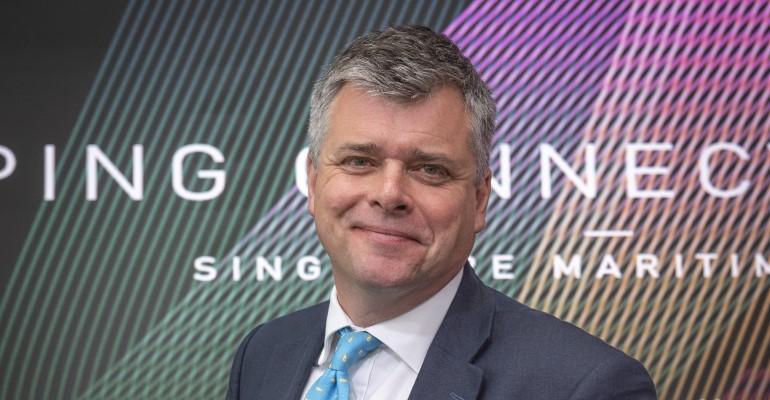In the ninth in a series of interviews ahead of Seatrade Maritime Logistics Middle East, Ben Palmer, President, Inmarsat Maritime, London, UK, spoke to Seatrade Maritime News about developments in the technology.
In February this year, Inmarsat’s I-6 F2 satellite went up from Cape Canaveral Space Force Station in Florida, to join I-6 F1, which launched from Japan in late 2021.
“This launch marked another milestone as we revolutionise global communications at scale and deliver network orchestration solutions to our customers. Orchestra will be a global network including Elera L-band and Global Xpress Ka-band networks with terrestrial 5G, targeted low earth orbit (LEO) capacity, and dynamic mesh technologies, delivering seamless connectivity worldwide, including high-demand hotspot areas,” he said.
In March, Inmarsat’s I-6 F1 satellite successfully connected to new ground stations in Western Australia, doubling the capacity in Asia Pacific region. The new capacity is highly flexible, offering 20 Ka-band spot beams per I-6 satellite that can be directed to meet customer demand second-by-second, allowing the company to steer capacity to ‘hotspots’ around the world, to prevent issues in congested areas.
“In addition to the need for flexible capacity, there’s no doubting that the satellites’ expanded L-band offering for our ELERA network has much to offer our maritime customers. ELERA not only enables Internet of Things (IoT) services, which will support the industry’s move towards automation, predictive maintenance and so on, but our critical safety services too,” he said.
“Features that go beyond the required GMDSS services, such as new automatic distress alerts sent to a network of over 60 Rescue Coordination Centres in less than two seconds. There’s also a ‘Two-way Distress Chat’ functionality that will put crews into a chat room, offering direct and constant contact with one of the nearby Search & Rescue Teams and local vessels, plus real-time vessel tracking.”
In 2022, technical trials in Singapore, one of the busiest ports in the world, verified the ability of ORCHESTRA’s maritime mesh technology—in which ships are used as range-extending ‘stepping stones’—to deliver additional capacity at hotspots via unique, shore-based terrestrial networks.
“We will add five more advanced spacecraft to our fleet by 2025 as part of our fully funded technology roadmap. That will allow us to continue to meet our customers’ needs into the 2030s and beyond, while enabling new technologies for a smarter, more connected Earth,” he said.
“Also scheduled for launch are the satellites carrying the world’s first and only mobile broadband payloads dedicated to the Arctic region.”
Shipping companies are more data-hungry than ever before, with the maritime industry using more data—with year-on-year demand for data more than doubling in some sectors. As this need for connectivity accelerates, so does the need for high-quality broadband to keep vessels connected wherever and whenever necessary, he said.
“Our Fleet Xpress helps shipping companies meet their individual vessel’s unique connectivity needs, ensuring that their data is as flexible as their business. It is built to deliver control over the connectivity ecosystem, making it easier to control data usage and digitalisation strategy, as their business evolves.”
Fleet Xpress is not a standard VSAT service—it is a versatile, fully integrated modular solution offering shipping companies a path to operational efficiency, decarbonisation and enhanced crew welfare through Inmarsat’s suite of value added services, such as Fleet Data—sensor- and supplier-agnostic IoT platform that facilitates data collection, transfer, storage and analysis of operational data; Fleet Hotspot—to answer crew connectivity requirements, especially today, when, seafarers are increasingly favouring employers that offer high-quality onboard internet; Fleet Secure cyber security solution, and more.
Palmer said ship-to-shore data connectivity was more than a bandwidth issue, as ship owners relied on more than high-bandwidth solutions to meet all their connectivity needs.
“As the maritime regulatory landscape evolves, shipowners place ever-greater emphasis on crew welfare, safety, decarbonisation and digitalisation. Demand for connectivity is soaring, and we see more and more shipping companies upgrading their satellite communications services to support the new technology adoption,” he said.
“By joining the dots between business goals and connectivity options, shipping companies gain access to a host of benefits, including opportunities to optimise and drive efficiency while reducing running costs and improving profit margins; the ability to attract and retain talented crew; and the capacity to future-proof operations and build in competitive advantages.”
In modern shipping, fast and reliable communications that support mission-critical operations, crew internet, operational safety and ship-to-shore data transfer simultaneously—all while protecting vessels from cyber-attacks—rely on bandwidth being delivered across multiple networks, he believes.
“Again, this is the idea that underpins Inmarsat’s multi-dimensional Orchestra solution. Delivering the highest capacity worldwide and at hotspots as well as the fastest average speeds and lowest average latency of any existing or planned network, Orchestra will also be backed by Inmarsat’s military-grade security infrastructure,” he said.
Seatrade Maritime News put it to Palmer that the different requirements for data connectivity between the shipping and aviation industries meant that sea connectivity could never be as ‘mission-critical’ as air connectivity.
“I would argue the opposite is true. In the aviation industry, data connectivity is primarily used to provide in-air entertainment to passengers. However, the core purpose of satellite connectivity in shipping has always been to support operational safety and business operations, while the strong focus on crew internet is a relatively recent—though no less important—development,” he said.
“In fact, a recent Inmarsat study reported a 131% year-on-year increase in maritime data usage associated with business operations—and with over 80% of goods transported by sea, maritime connectivity is clearly crucial to keeping the wheels of global trade in motion.”
Ben Palmer, President, Inmarsat Maritime, London, UK, is speaking at Seatrade Maritime Logistics Middle East, on May 16-18, 2023, in Dubai, UAE.
Copyright © 2024. All rights reserved. Seatrade, a trading name of Informa Markets (UK) Limited.
Add Seatrade Maritime News to your Google News feed.  |


